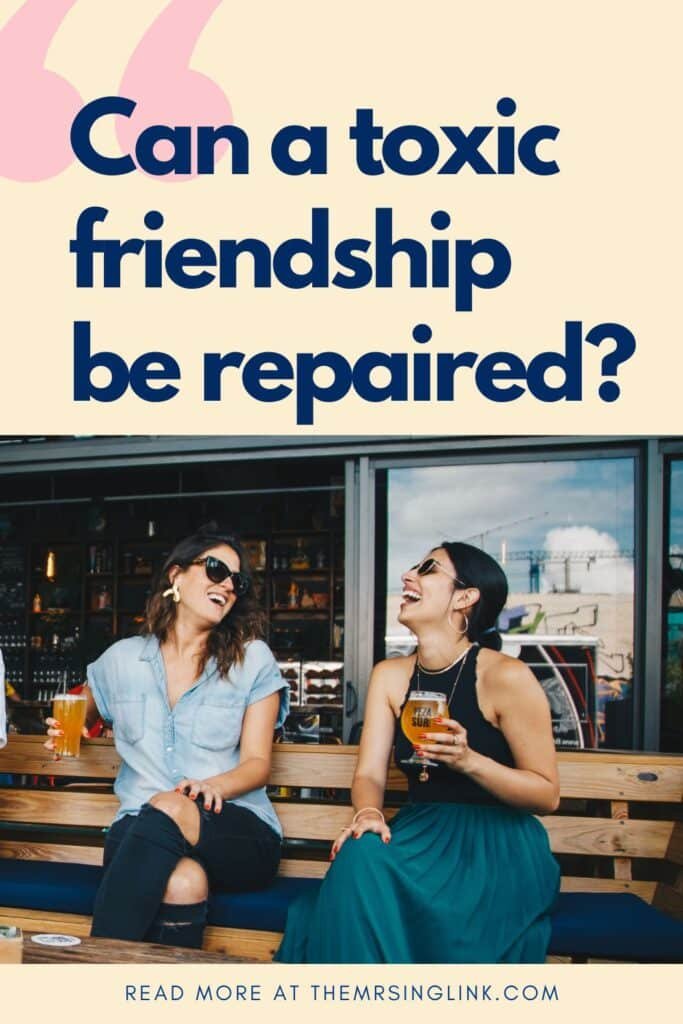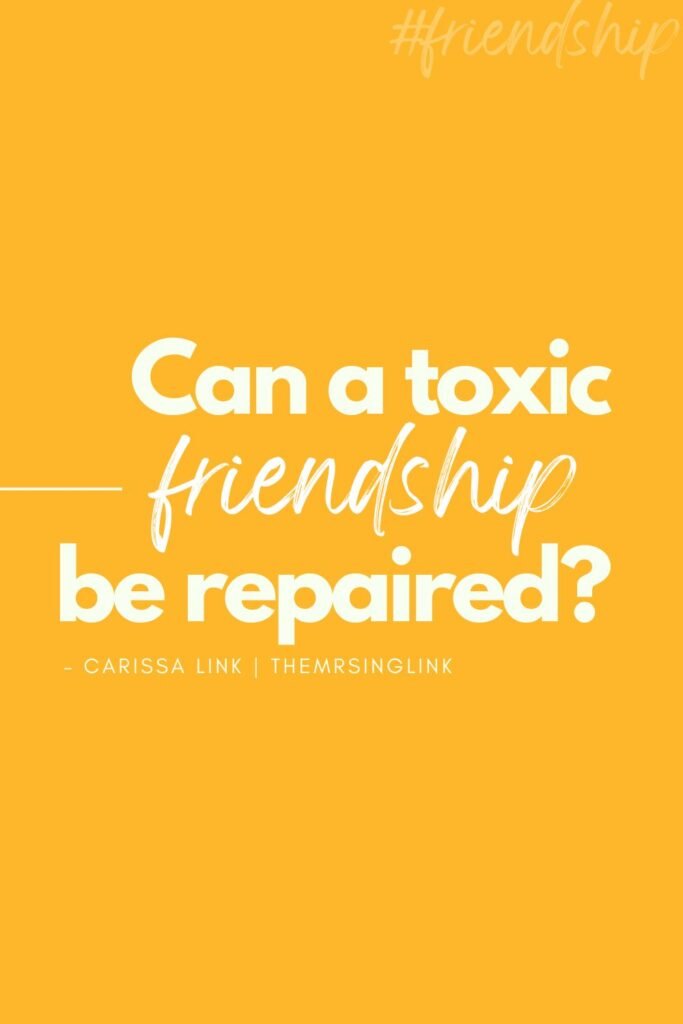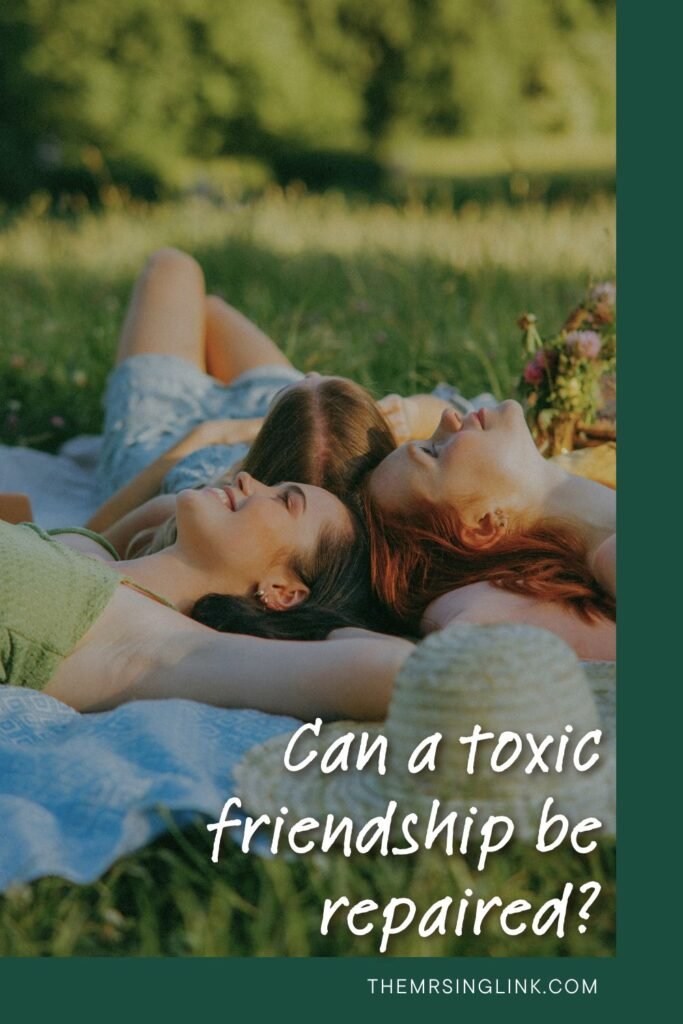Can an unhealthy or toxic friendship be fixed? The short answer is yes, of course it can. But I can’t just leave it at that, because that answer doesn’t account for what fixing or repairing entails. So the long answer is that, ultimately, it depends. It’s important to note that this post doesn’t necessarily unpack the signs of a toxic friendship, but rather how one may be turned around.
I find myself a little disheartened these days since it seems easier and utterly more convenient to just simply walk from or wipe our hands clean at the slightest hint of a tarnished friendship. On the other hand, unhealthy friendships also seem to be the norm and by that, I mean we have lost sight of what true friendship actually is. What do we do? We go on mirroring one another and enabling the unhealthy cycle to continue and flourish.
Frankly, it should at least be the goal to attempt at resolving a toxic friendship before waving the white flag and calling it quits. While I do agree that there are times cutting off friendship may be necessary, the question posed here is whether or not one can be resolved first and foremost.
Answering this question fully is based on many factors we need to be willing to acknowledge and accept, and that’s what I’m hoping to bring to light.
Can a toxic friendship be repaired?

Being “toxic” isn’t one-sided
Sure, you could take this to mean that both parties or friends are considered *toxic*. But that’s not entirely what I’m saying here. Being toxic isn’t one-sided, meaning it isn’t strictly the one perceived as obviously toxic.
We typically associate toxicity with the things that are bad – no-brainer, right? Bad, like talking behind that friend’s back, bad. There are so many negative trigger words we can probably associate with a toxic friendship, like belittling, mocking, judgmental, condescending, patronizing, bad-tempered, callous, resentful, aggressive, controlling, and begrudging just to name a few.
But what about the friend that isn’t necessarily those things but rather enables, condones, ignores, excuses, turns a blind eye to or even accompanies bad behavior? Listen, as someone who is undeniably a peace-keeper when it comes to things like confrontation, I run and hide – quite literally – at the sign of conflict. That in no way somehow makes me “The Healthy One”. That just because I may not be the one easily starting or engaging in fights, being the one who avoids them is no better.
Why am I pointing this out? Well, because most of the time toxic friendships are two-sided, where one side is well-versed in our culture while the other tends to get stroked on the back or stays under wraps. I’m just saying…there’s a side of toxicity that often gets the victim label when it shouldn’t. So if we want attempt to resolve a toxic friendship, we have to be willing to admit that there are generally two (sometimes polar opposite) sides to toxicity, or unhealthy behavior.
[Related Read: 5 Red flag signs you’re in a one-sided friendship]
No one is purely innocent
Using the point above, I should stress saying that since there are two sides to toxicity that this can also mean no one person or friend is considered “The Innocent One” by default. I’d argue that in many toxic friendships one is considered the perpetrator and the other a victim, yet we need to realize that simply isn’t *always* the case.
While I won’t deny that one may experience more detrimental effects from, again, the side of toxicity that is more boisterous, I still say that no one is purely innocent. We have to remember that for a friendship to end up being classified as a Toxic Friendship takes two people. This includes the friend who may not be participating but goes on allowing toxicity to continue.
For context, in the midst of trying to address and resolve conflict with a friend by accepting accountability for my role, she went on to say that the current issue between us, “was no one’s fault.” To be able to say that two people are blameless in a friendship that was clearly falling away left me too stunned to speak – literally.
That said, if a toxic friendship is ever to be nurtured back to health both parties must be willing to denounce their total innocence and acknowledge the part they play.
Change will inevitably be uncomfortable
Best case scenario is both people coming together for repair. This means mutual understanding of the toxic state of the friendship and motivation to make necessary changes. If this happens, great, but regardless change is bound to be uncomfortable.
Change isn’t comfortable in a toxic friendship because each person has been accustomed to behaving in ways that have nurtured a false sense of peace and safety. For instance, change isn’t always comfortable when it requires one or both friends to set and/or respect certain boundaries that had been taken for granted for its nonexistence.
Change, in this case, won’t always bring out “The Best” in people. Change, even for the better, can feel like a form of punishment for a friendship that has long withstood unhealthy behavior. The big question here is whether the foundation of a friendship can stand to endure it.
Individual capacity isn’t always mutual
With all (of the above) said and done, the capacity to repair a toxic friendship may not always be mutual, or equal. This means that while you may be capable of taking necessary strides to understand your role in that toxic friendship, accept accountability and embrace change, your friend may not, even if they seem to want to make the friendship work.
Externally their ready to make amends, but internally they simply can’t produce. Capacity isn’t just about a surface-level willingness, or want, but includes one’s current readiness to actually perform (i.e., to start, go, function, move, change). In every aspect of life, I imagine there are many who can deeply relate with this struggle – that even I experience.
Many will fail to see the toxic state of the friendship let alone see a need for repair at all. They may not have the capacity to acknowledge how their behavior hurts the friendship. Others may be able to acknowledge how unhealthy the friendship is yet are committed to issues being an other-sided fix. They may not be at the capacity of accepting accountability or an apology for their role. Some will even weaponize their behaviors. They may tie their behavior to an identity or as a fixed part of their *personality*.
These scenarios are oh-so-prominent in today’s culture of friendship.
I know I said at the beginning of this post that it is more than possible to resolve a toxic friendship, and I still say that is true, yet that doesn’t make it a guarantee. At the end of the day, it’s important to bear in mind that you can’t make someone take measures to repair a toxic friendship if they’re not willing or capable.

